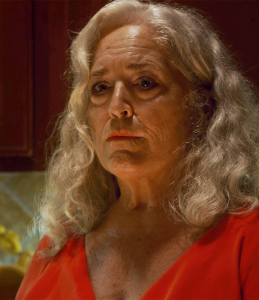
★★★☆☆
“Krisha,” the directorial debut of Trey Edward Shults, is a pressure cooker of a film that immerses audiences in an emotionally charged family reckoning. Winner of both the Grand Jury and Audience Awards at the 2015 South by Southwest Film Festival, as well as an official selection of Critics’ Week at the 2015 Cannes Film Festival, the drama stars Shults opposite his own aunt, Krisha Fairchild, in the titular role. The film, which receives its wide release today, is part thriller, part drama and fully nerve-wracking.
Set in Texas, the film revolves around its eponymous character. Anxious, hippie-ish and armed with a lockbox stocked with prescription pills, the 60-something woman decides to attend her family’s Thanksgiving festivities for the first time in years. Filmed in Shults’ parents’ house, and with a cast consisting of Shults’ mother, grandmother and friends, there is a unique feeling of intimacy and energy. Shults himself plays Krisha’s son, and the already-tense situation soon devolves as long-held secrets and resentments are revealed.
From the beginning of the film, Shults and cinematographer Drew Daniels work to make the viewer feel uneasily close to the action. The camera closely trails the subjects — especially Krisha — to create a heightened sense of tension. The two-story house is effectively used, with 360-degree sweeps that capture the action just as Krisha does, and shifts in aspect ratio convey the sense of a world literally closing in on her.
Another of the film’s most notable features is its Hitchcock-esque soundtrack crafted by Brian McOmber. Never has the preparation of a Thanksgiving meal been this intimidating; ticking percussion and piercing strings create a strikingly eerie atmosphere. Be it the family playing video games or the turkey being prepared, the juxtaposition with a soundtrack fit for a horror movie creates an uncomfortable but riveting viewing experience.
The story is revealed carefully, piece by piece. Viewers will realize early on that something sets Krisha apart from the rest of her family, but Shults reveals the truth ever so slowly. We feel Krisha’s crippling anxiety, pain, doubt and fear whenever we are alone with her, but we do not know the cause. Fairchild’s performance is remarkably powerful, especially given that she has mostly concentrated on voice work until this film. She is a formidable actress, and is sure to garner roles in other films after her standout performance here.
With the mainstream film industry dominated by blockbusters and superhero movies, The authenticity of “Krisha” separates it from the norm. Much of the dialogue seems unrehearsed, perhaps even unscripted. The scattered conversations and casual dynamic created between characters conjures up memories of viewers’ own Thanksgiving experiences.
Krisha — a greying, curvaceous woman in her late 60s — is not an actress we are accustomed to see heading a cinematic performance. In some ways, this is part of Krisha’s appeal: This is a character that viewers can imagine attending their family Thanksgiving, and her relatability is what roots this film in reality. Although Krisha is not the most sympathetic character, it is hard not to feel pity for her when the situation deteriorates. The fact that the film is filled with people the director grew up around and cares for makes the film even more authentic and introspective.
Krisha is not an exhilarating, fast-paced film. Rather, it is a performance piece that is remarkably successful in creating a palpable sense of paranoia. Drama is built up with nearly every scene, every camera movement and every exchange between characters. Although the moment tension is finally released is not as dramatic as one may have anticipated, the strength of Krisha is in Shults’ invitation into this family setting as if we were one of the relatives ourselves. We feel the ripple effect of the drama as if we were part of it. For a first-time writer and director, Shults’ success in making a tense, well-acted, too-close-for-comfort piece of cinema should be applauded.



















